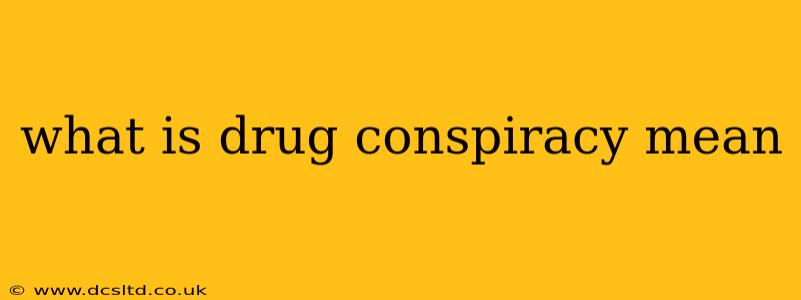Drug conspiracy is a serious federal and state crime carrying severe penalties, including lengthy prison sentences and substantial fines. It's crucial to understand its nuances, as it differs significantly from simply possessing or trafficking drugs. This post will break down what drug conspiracy means, explore common questions, and highlight the legal implications.
What Constitutes a Drug Conspiracy?
A drug conspiracy charge alleges that two or more individuals agreed to commit a drug-related crime, and at least one person took an overt act in furtherance of that agreement. This means it's not enough to simply talk about committing a crime; one party must take a concrete step toward achieving the criminal goal. This could involve anything from purchasing drug-making equipment to transporting illegal substances. The prosecution doesn't need to prove that the conspiracy was successful; the mere agreement and the overt act are sufficient for a conviction.
Key elements of a drug conspiracy charge typically include:
- Agreement: A mutual understanding between two or more individuals to commit a drug offense. This agreement doesn't require a formal contract or written document; it can be implied through actions and communications.
- Overt Act: At least one person must take a concrete step toward carrying out the agreement. This action doesn't need to be the ultimate goal of the conspiracy, just a step towards it.
- Knowledge and Intent: The prosecution must demonstrate that each participant knew about the conspiracy and intended to participate in it. Mere association with others involved in drug activity is generally insufficient.
What are the Penalties for Drug Conspiracy?
Penalties for drug conspiracy vary widely depending on several factors, including:
- Type of drug: Conspiracy involving more serious drugs like cocaine or heroin typically results in harsher penalties than those involving less serious drugs.
- Quantity of drugs: Larger quantities involved in the conspiracy lead to more significant penalties.
- Prior criminal history: Individuals with prior convictions face stiffer sentences.
- Role in the conspiracy: The individual's role (e.g., leader, distributor, or low-level participant) affects the sentencing.
- Federal vs. State Charges: Federal drug conspiracy charges generally carry more severe penalties than state-level charges.
These penalties can include lengthy prison sentences (ranging from years to life imprisonment), significant fines, and mandatory periods of supervised release after incarceration.
What is the Difference Between Drug Conspiracy and Drug Trafficking?
While often related, drug conspiracy and drug trafficking are distinct offenses. Drug trafficking focuses on the actual transportation, distribution, or sale of illegal drugs. Drug conspiracy, on the other hand, focuses on the agreement and actions taken to commit the drug offense, regardless of whether the actual drug crime was completed. You can be charged with both drug conspiracy and drug trafficking if the evidence supports both charges.
How is Drug Conspiracy Proved in Court?
The prosecution must prove all elements of the conspiracy beyond a reasonable doubt. Evidence commonly used to prove drug conspiracy includes:
- Wiretaps and recordings: Conversations between conspirators can provide compelling evidence.
- Witness testimony: Individuals involved in or with knowledge of the conspiracy can testify against others.
- Physical evidence: Seized drugs, drug paraphernalia, financial records, and other physical evidence can help establish the existence of the conspiracy.
- Informants: Confidential informants can provide valuable insight into the conspiracy.
What are the Defenses Against Drug Conspiracy Charges?
Several potential defenses exist against drug conspiracy charges, including:
- Lack of agreement: The defense might argue that no agreement existed to commit a drug crime.
- Lack of knowledge: The defense might claim the defendant was unaware of the conspiracy or its illegal nature.
- Entrapment: The defense might argue that law enforcement induced the defendant into participating in the conspiracy.
- Lack of overt act: The defense might contend that no overt act was committed in furtherance of the agreement.
It's crucial to remember that navigating drug conspiracy charges requires the expertise of a skilled criminal defense attorney. The complexities of the law and the potential for severe penalties necessitate legal representation from someone experienced in this area.
This information is for educational purposes only and should not be considered legal advice. If you face drug conspiracy charges, consult with a qualified attorney immediately.
